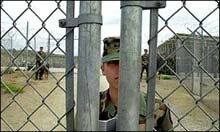 Human rights lawyer Clive Stafford-Smith talks to AI about his experiences inside the notorious US detention centre at Guantánamo Bay, Cuba Human rights lawyer Clive Stafford-Smith talks to AI about his experiences inside the notorious US detention centre at Guantánamo Bay, Cuba
I went to Guantánamo for the first time in November [2004] and I’ve been back four times now. You’re never quite sure whether to laugh or cry when you’re there. The soldiers go around saluting each other saying, "Honour bound, sir," and the other says, "To defend freedom".
I think if you’d been asking two years ago, would we be closing Guantánamo, it wouldn’t have been on the radar screen. Now Guantánamo is in its death throes, but of course, it’s always been a distraction from the real issues. And the real issues are if you’ve got 520 people in Guantánamo, there are probably another 12,000 folk who are being held in US detention centres around the world and being abused there. The bigger problem is, what’s the substitute? Unfortunately, I think, the US has plans to take a lot of prisoners away from Guantánamo to Bagram airforce base and beyond. We have to start thinking beyond Guantánamo Bay to all the other detention centres and American proxy prisons around the world.
The treatment of the prisoners has been one long horror story. Take, for example, the Koran desecration scandal. That is just one of many, many things that have been done. We’ve had prisoners who have been taken to Egypt to have electric shock torture. I’ve got a client who was taken to Morocco where they took a scalpel to his penis. Almost every single one of my clients has been subjected to the strappado [a technique used during the Spanish Inquisition] which is where you hang someone up by their wrists and basically dislocate their shoulders by leaving them there for ages, and you beat them while they’re up there.
 I have a terribly hard time establishing trust with the prisoners… Because of the manipulation and all this devious stuff, the prisoners are very paranoid. The moment we got lawyers in there, for example, the US military sent interrogators in pretending to be lawyers. I have a terribly hard time establishing trust with the prisoners… Because of the manipulation and all this devious stuff, the prisoners are very paranoid. The moment we got lawyers in there, for example, the US military sent interrogators in pretending to be lawyers.
We want prisoners to be released from Guantánamo, but it’s a more complicated issue than that. There’s a large number of folk who come from countries where they would be tortured or even killed. Our problem is that if you assert asylum and have nowhere to go, then you get locked up in prison. So unless we can find countries that are willing to accept prisoners, any time we claim asylum for someone, we’re just giving the Americans a ticket to hold them in Guantánamo forever.
One thing I find truly frightening about the whole process at Guantánamo Bay is how it exposes the incredible limitations on American intelligence. Perhaps the most obvious is that, after three years of interrogation, the United States military can’t even get my clients’ dates of birth right. I’m representing juveniles – children in Guantánamo Bay – and the US doesn’t even know their dates of birth. And if they can’t get that right who’s to think they get other things right? The argument that Guantánamo is producing very important intelligence is risible.
This is an edited extract from an interview with Clive Stafford-Smith, 13 June 2005, London. The opinions stated are those of the author and do not necessarily reflect AI policy.
- Click Here for Guantanamo Bay information page.
|